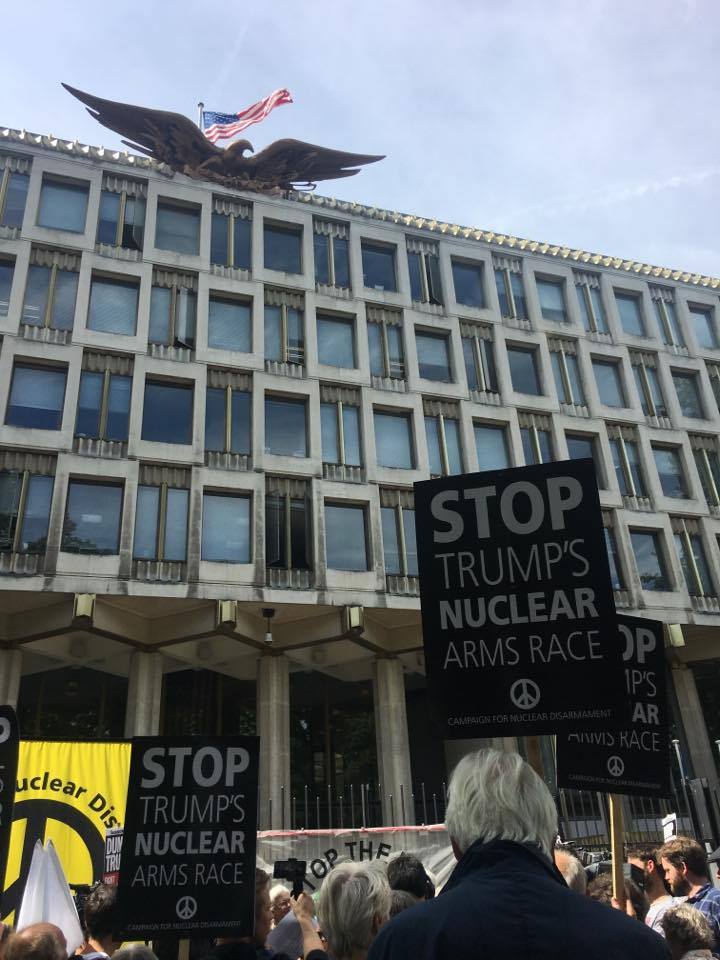Nuclear weapons and your university

Jack Ballingham is a member of Durham University CND.
Many of us have heard about the great work being done by Demilitarise Education recently about getting the arms trade off university campuses – but did you know that your university could have links to the nuclear weapons industry? Just like the conventional arms trade, Britain’s nuclear weapons are backed up by an industrial complex, which our universities are linked to and involved in just as much as any other.
When Durham Uni CND were considering what we should propose as part of a motion to our students’ union assembly, we included several campaign asks – for the students’ union to take a position in favour of the Treaty on the Prohibition of Nuclear Weapons, against the British nuclear “deterrent”, and to encourage our local authorities to sign up to schemes like Nuclear Free Local Authorities and the Mayors for Peace pledge.
We were also particularly motivated by the “Fossil Free Careers” campaign being run by People and Planet. The local environmental society at our University, Eco DU, had successfully got a motion through our students’ union assembly last year, asking the University to commit to ending careers ties with oil, gas and mining companies. Our university careers service promotes career “opportunities”, like graduate schemes and placement years, with all sorts of companies involved in the fossil fuel trade, particularly for students on courses like geology and engineering.
What careers links does Durham have to the nuclear weapons industry? We didn’t really expect there to be any. However, despite the fact that many of Britain’s nuclear weapons are American in origin, not all of them are. While the missiles themselves are produced in the USA, the submarines they’re fired from are made in Britain, produced and maintained largely by BAE Systems at Barrow-in-Furness in Cumbria. Not only that, but the warheads themselves (the actual bombs on the ends of the missiles) are produced at the Atomic Weapons Establishment (AWE), whose main site is at the Aldermaston facility in Berkshire that CND marched against in the 50s and 60s.
As it turned out, our university did have careers links with both of these. Through the student careers portal, you could apply to a nuclear engineering graduate role with BAE Systems, maintaining those submarines at Barrow. You could also apply to a placement year with the AWE at Aldermaston. The role offered “the opportunity to develop your skills and knowledge,” stating that the AWE has “unique expertise.”
Like the arms trade and the fossil fuels sector, the British nuclear weapons industry is being sustained by our universities and schemes like these. Some British universities also have massive financial ties to the industry. Through research and development funding, universities play a part in developing nuclear technologies, especially large technical universities.
What can you do on your campus? Finding out what ties your university has to nuclear weapons can be surprisingly easy. Have a scroll through current opportunities on your university’s careers portal, keeping a close eye out for those in the engineering and physics fields in particular. It may not be as blunt and obvious as the Atomic Weapons Establishment, but other firms are all involved in the production and maintenance of British nukes too. The campaign Don’t Bank on the Bomb has collated some information on ‘nuclear weapons producers’ here.
Funding and research can be more difficult to ascertain, but Demilitarise Education has a great tool that allows you to see what ties any UK university has to the arms industry, including nuclear arms – for instance, they have calculated that the University of Cambridge has a value of £22,949,161.46 in defence industry investments, and 7 ‘direct links’ with arms companies. Where is your university’s money coming from?
With the world now closer to nuclear war than many of us will remember, there has never been a time a more important time to expose the link between nuclear weapons and our universities. Ask your students’ union to work on exposing and cutting these links – you could even set up your own CND society using our guide here.
The views expressed across YSCND’s blogs are those of the author and do not necessarily reflect the views of the organisation.
